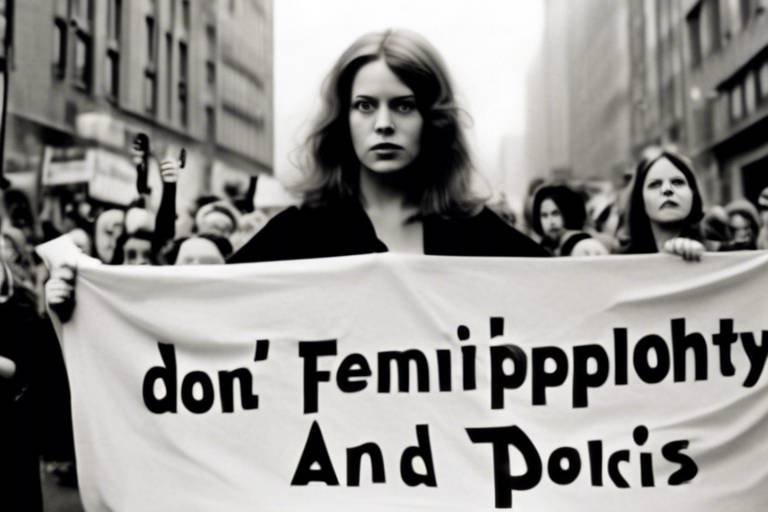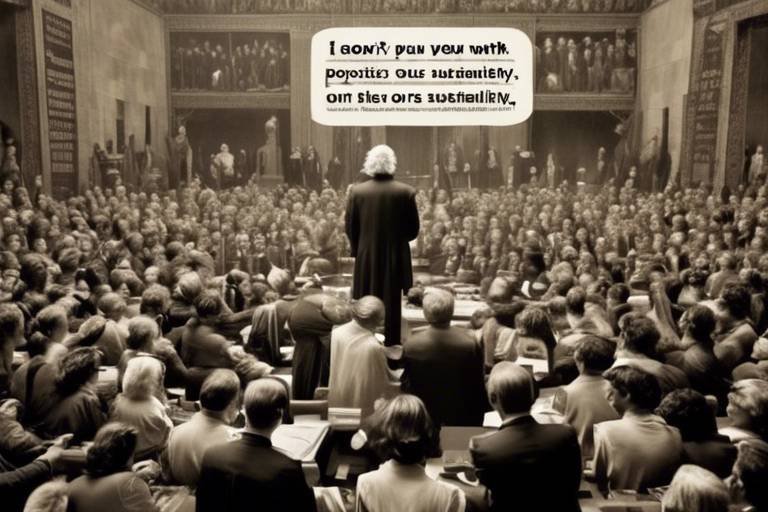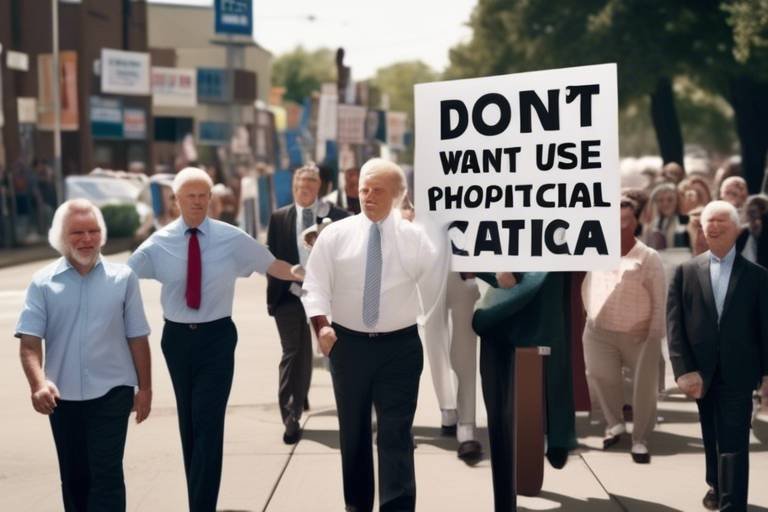Can Philosophy Justify Political Decisions?
In a world where political decisions can have profound impacts on society, the question arises: can philosophy truly justify these decisions? Philosophy, often seen as an abstract discipline, actually provides a framework through which we can analyze and critically evaluate the principles guiding political actions. Imagine a ship navigating through a stormy sea; without a compass, it risks veering off course. Similarly, philosophy serves as that compass, helping politicians and citizens alike to navigate the turbulent waters of governance, ethics, and justice.
Political decisions are not made in a vacuum. They are influenced by cultural, social, and economic factors, but at their core lies a set of beliefs and values that can often be traced back to philosophical thought. For instance, when a government decides to implement a new policy, it often relies on underlying ethical principles that dictate what is considered right or wrong. This reliance on ethics is crucial because it shapes the decisions that affect the lives of millions. Without a philosophical foundation, political actions can easily become arbitrary or unjust.
Moreover, the interplay between philosophy and politics is not merely theoretical; it has real-world implications. Consider the debates surrounding human rights, social justice, and governance. Each of these areas is steeped in philosophical discourse. When politicians advocate for policies that promote equality, they often draw upon philosophical theories that argue for fairness and justice, such as those proposed by John Rawls or the utilitarian perspectives of Jeremy Bentham. These theories provide a lens through which we can assess the morality and effectiveness of political decisions.
In essence, philosophy offers a toolkit for understanding the complexities of political life. It allows us to question the status quo, challenge unjust practices, and advocate for a more equitable society. By grounding political decisions in philosophical reasoning, we can ensure that they are not just reactions to immediate pressures but are instead informed by a deeper understanding of what is just and beneficial for the community as a whole.
As we delve deeper into the relationship between philosophy and political decision-making, we will explore various ethical frameworks, theories of justice, and the implications of political philosophy on governance. Each of these elements plays a crucial role in shaping the decisions that affect our lives, and understanding them is essential for anyone interested in the dynamics of power and authority.
- How does philosophy influence political decisions? Philosophy provides ethical frameworks and theories of justice that guide politicians in making decisions that reflect societal values.
- What are some key philosophical theories relevant to politics? Important theories include utilitarianism, Rawlsian justice, and the social contract theory, each offering unique perspectives on fairness and governance.
- Can philosophical principles be applied to real-world political issues? Yes, philosophical principles can be applied to various political issues, such as human rights and social justice, helping to justify and evaluate political actions.

The Role of Ethics in Politics
When we think about politics, the first thing that often comes to mind is power, strategy, and sometimes, controversy. But beneath all this chaos lies a fundamental question: What is the right thing to do? This is where ethics enters the political arena, acting as a compass that guides decision-makers through the murky waters of governance. Ethics isn't just about following rules; it's about making choices that reflect our values and principles. It’s the moral framework that helps politicians and policymakers navigate the complex landscape of societal needs and expectations.
To understand the significance of ethics in politics, we need to explore various ethical frameworks that shape political actions. For instance, consequentialism focuses on the outcomes of actions, suggesting that the rightness of a decision is determined by its results. In contrast, deontological ethics emphasizes the importance of following rules and duties, regardless of the consequences. This dichotomy raises important questions: Should politicians prioritize the greater good, even if it means sacrificing individual rights? Or should they adhere strictly to moral rules, even if it leads to less favorable outcomes? These questions are not just academic; they have real-world implications that affect millions of lives.
Moreover, ethical considerations are crucial during times of crisis. For example, during a pandemic, leaders must balance public health with economic stability. Should they impose strict lockdowns to save lives, or should they prioritize keeping businesses afloat? The decisions made in such scenarios are often fraught with ethical dilemmas, highlighting the need for a robust ethical framework. Without one, political decisions can become arbitrary, leading to a loss of trust in governance.
In addition, ethics in politics fosters accountability. When leaders are guided by ethical principles, they are more likely to act transparently and responsibly. This accountability is essential for maintaining public trust and ensuring that political decisions are made in the best interest of the community. When citizens believe that their leaders are acting ethically, they are more likely to engage in the political process, creating a healthier democracy.
To illustrate the impact of ethics on political decisions, consider the following table that outlines different ethical frameworks and their implications for governance:
| Ethical Framework | Key Principle | Implication for Politics |
|---|---|---|
| Consequentialism | Focus on outcomes | Decisions based on maximizing overall good |
| Deontological Ethics | Adherence to rules | Decisions based on moral duties and rights |
| Virtue Ethics | Character and integrity | Focus on the moral character of decision-makers |
| Utilitarianism | Greatest happiness principle | Policies aimed at achieving the greatest good for the greatest number |
In conclusion, the role of ethics in politics is not just an abstract concept; it is a vital component that shapes the decisions that affect our daily lives. As citizens, we must demand ethical leadership that prioritizes the common good, fosters accountability, and encourages active participation in the democratic process. After all, in a world where political decisions can have profound consequences, it’s our shared ethical values that can help guide us toward a more just and equitable society.
- Why is ethics important in politics? Ethics helps guide political decisions, ensuring they reflect societal values and principles.
- What are the main ethical frameworks in politics? The main frameworks include consequentialism, deontological ethics, virtue ethics, and utilitarianism.
- How do ethical considerations affect political accountability? Ethical principles promote transparency and responsibility, fostering trust between leaders and citizens.

Philosophical Theories of Justice
When we dive into the murky waters of justice, we find ourselves grappling with some profound questions: What does it mean to be fair? How do we ensure that everyone gets their due? Philosophical theories of justice provide us with a roadmap for navigating these complex issues. At the heart of these theories lies the quest for fairness and equality, each offering unique perspectives that can illuminate our understanding of political decision-making. Let’s explore a couple of the most influential theories: utilitarianism and Rawlsian justice.
Utilitarianism is a consequentialist theory championed by philosophers like Jeremy Bentham and John Stuart Mill. It posits that the best action is the one that maximizes overall happiness or utility. In political contexts, this theory can justify policies that aim to produce the greatest good for the greatest number. However, it raises a crucial question: can the happiness of the majority justify the suffering of a minority? This dilemma is where utilitarianism often gets tangled in ethical challenges, as it may lead to decisions that overlook individual rights in favor of collective well-being.
On the other hand, we have Rawlsian justice, introduced by John Rawls in his seminal work, "A Theory of Justice." Rawls argues for a system of justice based on fairness, encapsulated in his famous principles: the principle of equal liberty and the difference principle. The first principle guarantees equal basic rights for all, while the difference principle allows for social and economic inequalities only if they benefit the least advantaged members of society. This framework challenges us to think critically about how policies can be structured to ensure that everyone, especially the marginalized, has a fair shot at success.
To illustrate the differences between these two theories, consider the following table:
| Theory | Core Idea | Strengths | Weaknesses |
|---|---|---|---|
| Utilitarianism | Maximizing overall happiness | Focus on collective welfare | Can neglect individual rights |
| Rawlsian Justice | Fairness as a foundational principle | Protects the least advantaged | May be seen as impractical |
Both theories offer valuable insights into the complexities of justice, yet they also highlight the inherent tensions in political decision-making. While utilitarianism seeks to achieve the greatest good, it can sometimes lead to morally questionable outcomes. In contrast, Rawlsian justice emphasizes the importance of fairness but may struggle with the practicalities of implementation in a diverse society. As we consider these theories, it’s essential to ask ourselves: how can we strike a balance between the needs of the many and the rights of the few?
Ultimately, the exploration of these philosophical theories is not just an academic exercise; it’s a crucial part of understanding how political decisions are made and justified in our societies. By engaging with these ideas, we can better appreciate the moral underpinnings of our political systems and strive for a more just world.
- What is the main difference between utilitarianism and Rawlsian justice? Utilitarianism focuses on maximizing overall happiness, while Rawlsian justice emphasizes fairness and protecting the rights of the least advantaged.
- Can utilitarianism justify harmful policies? Yes, utilitarianism can potentially justify harmful policies if they result in a greater overall benefit, which raises ethical concerns.
- Why is Rawlsian justice considered more equitable? Rawlsian justice is seen as more equitable because it prioritizes the welfare of the least advantaged, ensuring that inequalities serve to improve their situation.

Political Philosophy and Governance
Political philosophy serves as the bedrock for understanding the intricate relationship between authority, governance, and the principles that guide political systems. At its core, political philosophy grapples with questions like: What is the nature of justice? How should power be distributed? And what legitimizes the authority of governments? These inquiries are not merely academic; they have profound implications for how societies are structured and governed.
One of the primary contributions of political philosophy is its ability to clarify the principles that underpin governance. For instance, the concept of legitimacy is central to understanding why citizens comply with laws and regulations. Philosophers like Thomas Hobbes and John Locke debated the origins of political authority, leading to the idea that governance should be based on a social contract between the rulers and the ruled. This contract implies that authority is not arbitrary but rather derived from the consent of the governed, a principle that remains vital in contemporary democracies.
Moreover, political philosophy encourages us to reflect on the moral responsibilities of those in power. It raises important questions about the ethical implications of political decisions. For example, when a government decides to implement a policy affecting public health, political philosophy prompts us to consider: Is this decision just? Does it uphold the rights and dignity of individuals? Such reflections are crucial in ensuring that governance is not only effective but also ethical.
Furthermore, the nature of political authority can be dissected through various philosophical lenses. Consider the contrasting views of utilitarianism and deontological ethics. Utilitarianism, which advocates for actions that maximize overall happiness, might justify certain political decisions that benefit the majority, even at the expense of a minority. In contrast, deontological ethics emphasizes the importance of duty and rights, arguing that some actions are inherently wrong regardless of their outcomes. This clash between consequentialist and non-consequentialist perspectives is pivotal in shaping political ideologies and policies.
Additionally, the role of democracy in governance is heavily influenced by philosophical thought. Democratic ideals are rooted in the belief that every individual has a voice and a right to participate in the decision-making process. Political philosophers like John Stuart Mill championed the idea that democracy not only allows for the expression of diverse opinions but also fosters a more informed citizenry. Consequently, governance that prioritizes democratic principles tends to be more responsive and accountable to the needs of its people.
In summary, political philosophy is not just an abstract discipline; it is a vital framework that informs and justifies political decisions. By examining the ethical implications of governance, the legitimacy of authority, and the principles of democracy, political philosophy provides the tools necessary for creating just and equitable societies. As we navigate the complexities of modern governance, the insights from political philosophy remain crucial in guiding our actions and policies.
- What is political philosophy? Political philosophy is a branch of philosophy that examines fundamental questions about government, politics, and justice.
- Why is political philosophy important? It helps us understand the principles that govern society and the ethical implications of political decisions.
- Who are some key figures in political philosophy? Notable philosophers include Plato, Aristotle, John Locke, Thomas Hobbes, and John Stuart Mill.
- How does political philosophy influence modern governance? It provides frameworks for understanding authority, legitimacy, and the ethical responsibilities of political leaders.

Pragmatism in Political Decision-Making
Pragmatism, at its core, is about practicality and the real-world consequences of our choices. When it comes to political decision-making, this philosophy emphasizes the importance of outcomes over abstract principles. Rather than getting caught up in ideological debates, pragmatists focus on what works best for society. Imagine you're a chef trying to create a new dish. You wouldn't just rely on a recipe; you'd taste, adjust, and adapt based on the feedback and results. Similarly, political leaders must be willing to tweak their policies based on the **feedback** they receive from the populace and the effectiveness of those policies in practice.
In the political arena, pragmatism encourages leaders to consider the following key aspects:
- Flexibility: Political decisions should be adaptable. What works today may not work tomorrow, and a pragmatic approach allows for adjustments.
- Evidence-Based Decisions: Decisions should be grounded in data and real-world experiences rather than solely on theoretical ideals.
- Collaborative Solutions: Engaging various stakeholders can lead to more effective and inclusive policies.
For instance, consider the debate surrounding climate change. A purely ideological approach might lead to strict regulations that some argue could harm the economy. However, a pragmatic approach would examine the evidence and seek a balance that addresses environmental concerns while also considering economic impacts. This might involve incentivizing green technologies rather than imposing heavy regulations, allowing for a more sustainable and practical solution.
Moreover, pragmatism in political decision-making often leads to compromises. In a world where political polarization seems to be the norm, finding common ground can be a challenge. However, when leaders adopt a pragmatic mindset, they are more likely to seek solutions that benefit the majority, even if it means sacrificing certain ideological purities. It's like a group of friends trying to decide on a movie to watch; instead of arguing over preferences, they might end up choosing a film that everyone can enjoy, even if it’s not their first choice.
Additionally, pragmatism encourages a focus on the long-term consequences of political decisions. While immediate results are crucial, the implications of those decisions can ripple through society for years to come. For example, implementing a new educational policy might yield quick benefits, but if it neglects the needs of certain student populations, the long-term effects could be detrimental. A pragmatic approach would involve assessing both the immediate and future impacts of such policies.
In summary, pragmatism in political decision-making is about being responsive to the needs of society, prioritizing effective solutions, and being willing to adapt based on real-world outcomes. It’s a refreshing reminder that sometimes, the best path forward isn’t the one that aligns perfectly with an ideology, but rather the one that leads to tangible benefits for the people. As we navigate the complexities of governance, embracing a pragmatic approach can help us build a more resilient and effective political landscape.
- What is pragmatism in politics? Pragmatism in politics refers to a practical approach to decision-making that emphasizes the importance of outcomes and real-world consequences over strict adherence to ideology.
- How does pragmatism differ from other political philosophies? Unlike other political philosophies that may focus on ideals or theories, pragmatism prioritizes what works in practice and encourages flexibility and adaptability.
- Can pragmatism lead to effective governance? Yes, by focusing on practical solutions and being responsive to the needs of society, pragmatism can lead to more effective and inclusive governance.

The Social Contract and Political Legitimacy
The concept of the social contract has been a cornerstone in political philosophy, providing a framework for understanding how individuals come together to form societies and establish governance. At its core, the social contract theory posits that individuals consent, either explicitly or implicitly, to surrender some of their freedoms and submit to the authority of a governing body in exchange for protection of their remaining rights. This mutual agreement is what grants political authority its legitimacy. Think of it as a kind of unwritten agreement where everyone agrees to play by the rules for the sake of social order and collective well-being.
Philosophers like Thomas Hobbes, John Locke, and Jean-Jacques Rousseau have each contributed distinct perspectives on the social contract, shaping our understanding of political legitimacy. Hobbes, for instance, viewed the social contract as a necessity to escape the brutish state of nature, advocating for a powerful sovereign to maintain peace and security. In contrast, Locke’s interpretation emphasized the protection of natural rights—life, liberty, and property—arguing that government should be a representative body that derives its power from the consent of the governed. Rousseau, on the other hand, critiqued the inequalities inherent in society and proposed a more egalitarian social contract where the general will of the populace guides governance.
The implications of these theories are profound. They raise critical questions about the nature of authority and the conditions under which political power is justified. For example, if a government fails to protect the rights of its citizens or acts against their interests, does it lose its legitimacy? This question is particularly relevant in contemporary society, where issues of corruption, inequality, and authoritarianism challenge the foundational principles of the social contract. Citizens often find themselves grappling with the dilemma of whether to accept the status quo or to seek change through protest or revolution.
Furthermore, the social contract theory also provides a lens through which we can evaluate the role of democracy in legitimizing political authority. In democratic societies, the social contract is often enacted through the electoral process, where citizens express their consent by voting. This participation is crucial; it transforms the abstract concept of the social contract into a tangible practice, allowing individuals to influence decisions that affect their lives. However, the effectiveness of this system hinges on the idea that all voices are heard and that the government remains accountable to its citizens.
To illustrate the relevance of the social contract today, consider the following table that outlines the key differences in how Hobbes, Locke, and Rousseau view political legitimacy:
| Philosopher | View on Human Nature | Type of Government | Source of Legitimacy |
|---|---|---|---|
| Thomas Hobbes | Pessimistic; humans are self-interested | Absolute monarchy | Social contract for security |
| John Locke | Optimistic; humans are rational and cooperative | Representative democracy | Consent of the governed |
| Jean-Jacques Rousseau | Idealistic; humans are inherently good | Direct democracy | General will of the people |
In conclusion, the social contract remains a vital concept in understanding political legitimacy. It compels us to reflect on our roles as citizens and the responsibilities of our governments. By engaging with these philosophical ideas, we can better navigate the complexities of modern governance and advocate for a political system that truly represents the will and welfare of the people.
- What is the social contract? The social contract is a theoretical agreement among individuals to form a society and establish a governing authority in exchange for protection and social order.
- Who are the key philosophers associated with social contract theory? Key philosophers include Thomas Hobbes, John Locke, and Jean-Jacques Rousseau, each offering different perspectives on human nature and the legitimacy of government.
- How does the social contract relate to democracy? The social contract underpins democratic principles by emphasizing the importance of consent from the governed and the accountability of the government to its citizens.
- Can a government lose its legitimacy? Yes, if a government fails to protect the rights of its citizens or acts against their interests, it can lose its legitimacy according to social contract theory.

Philosophy and Human Rights
When we think about human rights, it's impossible to ignore the profound influence of philosophy in shaping our understanding of what these rights entail. At its core, human rights are about recognizing the inherent dignity of every individual. Philosophers have long debated the foundations of these rights, asking questions like, "What makes a right a right?" and "Who has the authority to grant or deny these rights?"
Historically, the concept of human rights has evolved through various philosophical lenses. For instance, the Enlightenment era brought forth ideas from thinkers like John Locke, who argued that individuals possess natural rights to life, liberty, and property. Locke's philosophy laid the groundwork for modern human rights discourse, suggesting that these rights are not granted by any government but are inherent to every person simply by being human.
Moreover, the philosophical underpinnings of human rights can be seen as a response to the injustices of the past. Consider the atrocities committed during wars and genocides; they highlight the need for a universal standard of rights that transcends cultural and national boundaries. Philosophers like Immanuel Kant emphasized the importance of treating individuals as ends in themselves, not merely as means to an end. This principle resonates deeply in human rights discussions, advocating for the protection of individuals against oppression and abuse.
In contemporary society, human rights are often framed within the context of various philosophical theories. For example, utilitarianism evaluates human rights based on their outcomes. A utilitarian might argue that rights should be upheld if they contribute to the greatest happiness for the greatest number. However, this perspective can lead to ethical dilemmas, as it may justify sacrificing individual rights for the sake of the majority's well-being.
On the other hand, Rawlsian justice offers a different take. John Rawls proposed the idea of "justice as fairness," where he argued that a just society is one that ensures the most disadvantaged are provided with opportunities. This approach emphasizes the importance of equality and fairness, making it a strong advocate for human rights as a means of protecting the vulnerable in society.
In addition, the philosophical discourse surrounding human rights often intersects with issues of social justice. Philosophers like Marx and Foucault challenge the traditional notions of rights by critiquing the power structures that define them. They argue that human rights can sometimes be co-opted by those in power to maintain the status quo, raising important questions about the genuine applicability of these rights in different contexts.
As we navigate the complexities of human rights in today's world, it's essential to recognize the philosophical debates that inform our understanding. Whether discussing the right to free speech, the right to education, or the right to healthcare, these discussions are deeply rooted in philosophical thought. Ultimately, the quest for human rights is not just about legal frameworks but about recognizing our shared humanity and the moral imperatives that bind us together.
- What are human rights? Human rights are fundamental rights that belong to every individual, regardless of nationality, sex, ethnicity, or religion.
- How does philosophy influence human rights? Philosophy provides the ethical framework and principles that shape our understanding of human rights and their importance in society.
- Who is responsible for protecting human rights? It is the responsibility of governments, organizations, and individuals to uphold and protect human rights.
- Can human rights change over time? Yes, the interpretation and application of human rights can evolve as societal values and norms change.

Rationalism vs. Empiricism in Politics
When we dive into the world of political thought, we often come across two heavyweight contenders: rationalism and empiricism. These philosophical approaches shape not just our understanding of politics but also how decisions are made. So, what’s the difference? In a nutshell, rationalism emphasizes the role of reason and logic, while empiricism champions experience and observation as the primary sources of knowledge. Think of rationalism as the architect sketching out a grand design based on theoretical ideals, while empiricism is the builder who learns from the materials at hand, adjusting plans based on what works in practice.
Rationalists argue that political decisions should be grounded in universal principles and logical deductions. They believe that through reason, we can arrive at the best solutions for society. For instance, a rationalist might advocate for policies that align with the concept of justice as fairness, proposing that we should create systems that ensure equality and protect individual rights. This approach often leads to a more structured and perhaps idealistic view of governance, where the emphasis is on creating frameworks that can withstand the test of time.
On the flip side, empiricists argue that political decisions should be based on real-world experiences and outcomes. They contend that abstract theories can often fall flat when faced with the complexities of human behavior and societal dynamics. Imagine trying to govern a diverse population based solely on a theoretical model; it could lead to policies that sound good in theory but fail miserably in practice. Empiricists advocate for a more flexible approach, one that adapts to the needs and realities of the people it serves.
To illustrate this tension, consider a contemporary example: the debate over climate change policies. Rationalists might propose sweeping regulations based on scientific theories about climate justice, arguing that we must act decisively to protect future generations. Empiricists, however, might point to the varying impacts of such regulations on different communities, urging policymakers to consider local economies and social structures before implementing broad changes. This is where the clash of rationalism and empiricism becomes not just philosophical but deeply practical.
| Aspect | Rationalism | Empiricism |
|---|---|---|
| Source of Knowledge | Reason and Logic | Experience and Observation |
| Approach to Policy | Universal Principles | Practical Outcomes |
| Example in Politics | Theoretical Justice Models | Community-Based Solutions |
Ultimately, the interplay between rationalism and empiricism in politics is a dance of ideals and realities. It’s crucial for policymakers to find a balance between the two. After all, if we lean too heavily on rationalism, we might end up with policies that are out of touch with the lived experiences of the people they affect. Conversely, an over-reliance on empiricism could lead to a lack of vision and direction, resulting in reactive rather than proactive governance.
As we navigate the complexities of contemporary political landscapes, it’s essential to recognize that both rationalism and empiricism have valuable contributions to make. By integrating the strengths of both approaches, we can strive for a political system that is not only grounded in sound reasoning but also responsive to the ever-changing realities of human society.
- What is rationalism in politics? Rationalism in politics emphasizes the importance of reason and logical deduction in making political decisions.
- How does empiricism differ from rationalism? Empiricism focuses on experience and observation as the primary sources of knowledge, while rationalism relies on theoretical ideals.
- Why is the balance between rationalism and empiricism important? A balance ensures that policies are both well-reasoned and responsive to real-world needs, creating a more effective governance system.

Case Studies: Philosophy in Action
When we think about the intersection of philosophy and politics, it’s easy to get lost in abstract theories and lofty ideals. However, the real world is where these ideas take shape and influence the lives of millions. Let’s explore some compelling case studies that illustrate how philosophical principles have been applied to justify political decisions, making a tangible impact on society.
One of the most notable examples is the civil rights movement in the United States during the 1960s. Activists like Martin Luther King Jr. drew heavily from the philosophy of nonviolence and the moral imperative for justice. King’s famous “I Have a Dream” speech is not just a call to action; it’s rooted in a profound understanding of ethical principles that transcend race and class. By appealing to the moral conscience of the nation, he effectively used philosophical reasoning to justify the demand for equality and civil rights, framing it as a matter of justice that the government could no longer ignore.
Another significant case study is the implementation of universal healthcare in various countries. Philosophers like John Rawls have argued for the principle of justice as fairness, which posits that societal structures should benefit the least advantaged. Countries like Sweden and Canada have adopted healthcare systems that embody these principles. Their political decisions to provide universal healthcare are justified through a philosophical lens that prioritizes equity and the well-being of all citizens, particularly the vulnerable. The outcomes have shown that when healthcare is treated as a right rather than a privilege, overall societal health improves, demonstrating the real-world impact of philosophical thought.
Additionally, we can look at the environmental policies enacted in response to climate change. The philosophical concept of utilitarianism, which advocates for actions that maximize overall happiness, has driven many governments to adopt more sustainable practices. For instance, the Paris Agreement represents a collective response to climate change, where nations committed to reducing carbon emissions for the greater good. This political decision was justified by the utilitarian argument that protecting the planet ensures a better future for all, reinforcing the idea that political actions should consider long-term consequences for humanity and the environment.
These case studies reveal a crucial insight: philosophy is not just theoretical; it has practical implications that can guide political decision-making. By grounding political actions in ethical frameworks, theories of justice, and pragmatic considerations, leaders can create policies that resonate with the values and needs of their constituents. The challenge lies in ensuring that these philosophical principles are not only understood but actively applied in governance.
In conclusion, the integration of philosophy into political decision-making is not merely an academic exercise; it is a vital component of effective governance. As we continue to face complex challenges in society, the lessons drawn from these case studies remind us of the power of philosophical thought to inspire meaningful change. By embracing these principles, we can navigate the turbulent waters of politics with a moral compass that prioritizes justice, equity, and the common good.
- How does philosophy influence political decisions? Philosophy provides ethical frameworks and principles that can guide lawmakers in creating just and equitable policies.
- Can philosophical theories be applied to modern governance? Yes, many contemporary political decisions are influenced by philosophical theories such as utilitarianism and social contract theory.
- What is the significance of case studies in understanding philosophy and politics? Case studies illustrate how philosophical concepts are applied in real-world scenarios, showcasing their relevance and impact on society.
- Are there any downsides to using philosophy in politics? While philosophy can provide guidance, it may also lead to disagreements or conflicts if differing ethical frameworks are applied.
Frequently Asked Questions
- How does philosophy influence political decisions?
Philosophy provides a framework for understanding ethical principles and justice, which are essential in guiding political decisions. By applying philosophical theories, policymakers can evaluate the moral implications of their actions and strive for fairness and equality in governance.
- What role do ethical frameworks play in politics?
Ethical frameworks serve as a foundation for political actions, helping leaders navigate complex moral dilemmas. These frameworks, such as utilitarianism or deontological ethics, guide decision-makers in assessing the consequences of their policies and the rights of individuals affected.
- Can you explain the concept of the social contract?
The social contract is a philosophical theory that posits that individuals consent, either explicitly or implicitly, to form a society and abide by its rules in exchange for protection and social order. This concept underpins the legitimacy of political authority and governance.
- What is the significance of human rights in political philosophy?
Human rights are grounded in philosophical discourse, asserting that all individuals possess inherent rights that must be respected and protected. Political decisions must consider these rights to ensure that governance aligns with ethical standards and promotes individual freedoms.
- How do rationalism and empiricism affect political thought?
The debate between rationalism and empiricism shapes political ideologies by influencing how knowledge is acquired and applied in governance. Rationalists prioritize reason and theoretical frameworks, while empiricists emphasize experience and observation, leading to different approaches in political decision-making.
- What are some real-world examples of philosophy in action?
There are numerous instances where philosophical principles have justified political decisions, such as the implementation of social welfare programs based on utilitarian ethics or the establishment of human rights laws inspired by Kantian philosophy. These cases illustrate the practical application of philosophical theories in shaping effective governance.
- Why is pragmatism important in political decision-making?
Pragmatism focuses on the practical consequences of decisions rather than abstract principles. This approach encourages policymakers to consider the real-world implications of their choices, promoting effective governance that addresses immediate societal needs and challenges.
- How do philosophical theories of justice impact political policies?
Philosophical theories of justice, such as Rawlsian justice, provide insights into what constitutes fairness and equality in society. These theories guide the development of political policies aimed at addressing social inequalities and ensuring that all individuals have access to opportunities.



















